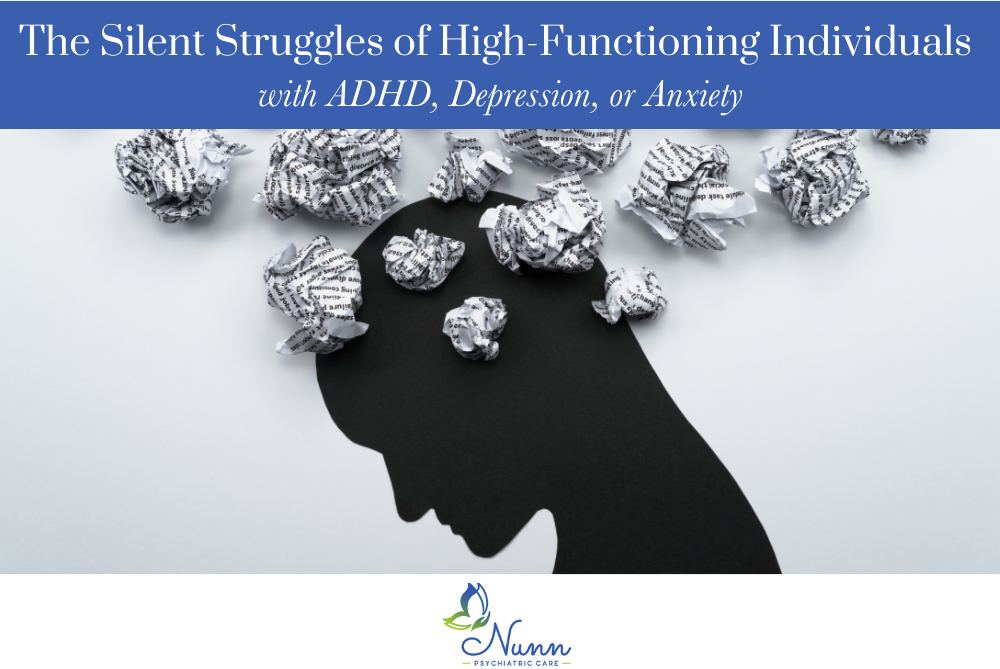 Brought to you by Nunn Psychiatric Care
Brought to you by Nunn Psychiatric Care
113 Lincoln Dr, Hodgenville, KY 42748
📞 (270) 358-6221
Mental health challenges don’t always look like what we expect. Many individuals live with conditions like ADHD, depression, or anxiety and still manage to maintain a high level of functionality. These individuals might succeed in their careers, keep up appearances in social settings, and appear to have their lives under control. Yet beneath the surface, they are silently battling symptoms that can be overwhelming, isolating, and exhausting.
At Nunn Psychiatric Care, we understand that mental illness doesn’t always manifest in obvious ways. High-functioning individuals deserve recognition, support, and access to care just like anyone else. In this blog, we shine a light on the silent struggles that often go unnoticed in people with high-functioning ADHD, depression, or anxiety.
What Does “High-Functioning” Really Mean?
The term “high-functioning” is often used to describe individuals who, despite experiencing mental health symptoms, appear to manage their daily responsibilities well. They may:
- Hold down a job or succeed academically
- Maintain relationships and social commitments
- Appear outwardly confident and composed
- Hide their symptoms from others
But high-functioning does not mean symptom-free. In many cases, these individuals are overcompensating, masking their internal struggles, or pushing themselves to the brink of burnout in an effort to “seem fine.”
The Hidden Side of High-Functioning ADHD
High-functioning ADHD often flies under the radar. Adults with this condition may seem successful but internally struggle with:
- Chronic procrastination
- Disorganization
- Impulsivity masked as “risk-taking” behavior
- Difficulty focusing or finishing tasks
- Mental fatigue from constant overcorrection and masking
They may develop coping mechanisms like overworking, perfectionism, or excessive list-making. Though these habits can help them function outwardly, they often come at a high emotional cost.
Depression Behind a Smile
High-functioning depression—also known as persistent depressive disorder or dysthymia—doesn’t always present with sadness or withdrawal. Instead, individuals may:
- Go through the motions without feeling joy
- Experience a persistent low mood or emptiness
- Feel guilty for not being “grateful” or “happy”
- Struggle with low self-esteem despite achievements
- Use humor or busyness to mask how they feel
The pressure to keep up appearances can make it even harder to seek help, leading to feelings of isolation and disconnection.
The Quiet Chaos of High-Functioning Anxiety
Individuals with high-functioning anxiety may appear organized, driven, and on top of things—but internally they are:
- Plagued by constant worry
- Overanalyzing every decision or interaction
- Relying on routine and control to manage fear
- Struggling with insomnia, muscle tension, or racing thoughts
- Afraid of failure or being seen as “not good enough”
The very traits that make them appear successful—like perfectionism or productivity—are often driven by anxiety, not confidence.
Why These Struggles Often Go Unnoticed
- They’re masters of masking. High-functioning individuals often downplay or hide their symptoms.
- They fear stigma. Many worry that seeking help could damage their reputation or relationships.
- They don’t “look” like they’re struggling. Society tends to associate mental illness with visible distress, not achievement.
- They invalidate their own experiences. “I shouldn’t feel this way—I have a good job, friends, and family” is a common thought pattern.
How Nunn Psychiatric Care Can Help
At Nunn Psychiatric Care, we specialize in understanding the complexities of mental health across all spectrums. We recognize that people who appear to be coping well might be silently struggling and in need of compassionate support.
Whether you’re dealing with high-functioning ADHD, depression, anxiety—or a combination—we provide a safe, non-judgmental space to talk, heal, and build personalized treatment plans.
Frequently Asked Questions (FAQ)
Q: What is the difference between high-functioning and low-functioning mental health conditions?
A: The term “high-functioning” refers to someone who can carry out daily responsibilities despite their mental health challenges. “Low-functioning” typically describes someone whose symptoms significantly interfere with daily living. It’s important to note that both types of individuals deserve support and care.
Q: Can someone be both high-functioning and still need therapy or medication?
A: Absolutely. Just because someone is performing well on the outside doesn’t mean they don’t need help. Therapy, medication, or a combination of both can be very beneficial—even for those who are outwardly successful.
Q: How do I know if I’m dealing with high-functioning depression or anxiety?
A: If you consistently feel tired, unmotivated, worried, or emotionally numb—but you continue to fulfill daily roles—it’s possible you’re experiencing a high-functioning mental health condition. A mental health professional can help evaluate your symptoms and provide clarity.
Q: What are some signs I might be masking ADHD?
A: Signs of masked ADHD include extreme reliance on calendars/lists, hyperfocus on certain tasks but avoidance of others, feeling mentally overwhelmed, and self-doubt about your capabilities. If you’re constantly fighting to stay organized or focused, an ADHD assessment may be helpful.
Q: Is it ever “too late” to seek help for these issues?
A: Never. Whether you’ve been struggling silently for years or are just starting to notice symptoms, it’s always the right time to get support. Mental health is a lifelong journey, and help is available no matter where you are on that path.
Q: How can I support a loved one who seems high-functioning but might be struggling?
A: Offer a listening ear without judgment. Let them know you see them and that you care. Encourage them to talk to a mental health professional. Avoid minimizing their experience with phrases like “but you seem fine” or “you’re doing great.”
Take the First Step—You Don’t Have to Do It Alone
If you or someone you love is silently struggling with ADHD, depression, or anxiety, help is available. You don’t have to keep it all together on the outside while falling apart inside.
Let Nunn Psychiatric Care be your partner in healing. We offer a compassionate, confidential approach tailored to your needs.
📍 Visit Us:
Nunn Psychiatric Care
113 Lincoln Dr
Hodgenville, KY 42748
📞 Call Today: (270) 358-6221 Request An Appointment
Take that first step—your mental health matters.
